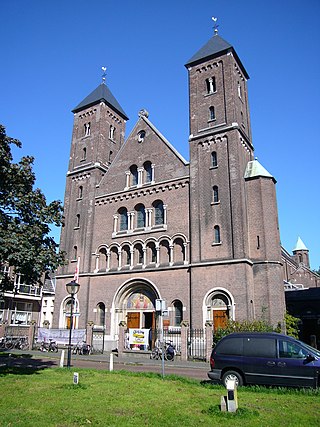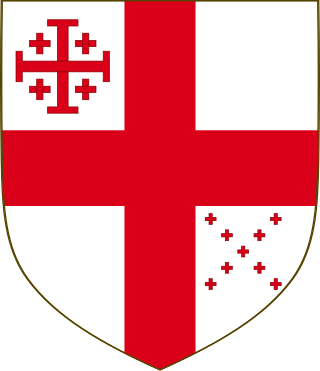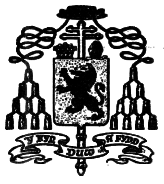
The Anglican Communion is the third largest Christian communion after the Roman Catholic and Eastern Orthodox churches. Formally founded in 1867 in London, the communion has more than 85 million members within the Church of England and other autocephalous national and regional churches in full communion. The traditional origins of Anglican doctrine are summarised in the Thirty-nine Articles (1571) and The Books of Homilies. The archbishop of Canterbury in England acts as a focus of unity, recognised as primus inter pares, but does not exercise authority in Anglican provinces outside of the Church of England. Most, but not all, member churches of the communion are the historic national or regional Anglican churches.

An episcopal polity is a hierarchical form of church governance in which the chief local authorities are called bishops. The word "bishop" here is derived via the British Latin and Vulgar Latin term *ebiscopus/*biscopus, from the Ancient Greek ἐπίσκοπος epískopos meaning "overseer". It is the structure used by many of the major Christian Churches and denominations, such as the Catholic, Eastern Orthodox, Oriental Orthodox, Church of the East, Anabaptist, Lutheran, and Anglican churches or denominations, and other churches founded independently from these lineages. Many Methodist denominations have a form of episcopal polity known as connexionalism.
The terms Old Catholic Church, Old Catholics, Old-Catholic churches, or Old Catholic movement, designate "any of the groups of Western Christians who believe themselves to maintain in complete loyalty the doctrine and traditions of the undivided church but who separated from the See of Rome after the First Vatican council of 1869–70".
Full communion is a communion or relationship of full agreement among different Christian denominations or Christian individuals that share certain essential principles of Christian theology. Views vary among denominations on exactly what constitutes full communion, but typically when two or more denominations are in full communion it enables services and celebrations, such as the Eucharist, to be shared among congregants or clergy of any of them with the full approval of each.

Ecumenism – also called interdenominationalism, or ecumenicalism – is the concept and principle that Christians who belong to different Christian denominations should work together to develop closer relationships among their churches and promote Christian unity. The adjective ecumenical is thus applied to any non-denominational or inter-denominational initiative which encourages greater cooperation and union among Christian denominations and churches. Ecumenical dialogue is a central feature of contemporary ecumenism.
The Continuing Anglican movement, also known as the Anglican Continuum, encompasses a number of Christian churches, principally based in North America, that have an Anglican identity and tradition but are not part of the Anglican Communion.

Open communion is the practice of some Protestant Churches of allowing members and non-members to receive the Eucharist. Many but not all churches that practice open communion require that the person receiving communion be a baptized Christian, and other requirements may apply as well. In Methodism, open communion is referred to as the open table, meaning that all may approach the Communion table.

The history of the Anglican Communion may be attributed mainly to the worldwide spread of British culture associated with the British Empire. Among other things the Church of England spread around the world and, gradually developing autonomy in each region of the world, became the communion as it exists today.

The Reformed Episcopal Church (REC) is an Anglican Church. It was founded in 1873 in New York City by George David Cummins, a former bishop of the Protestant Episcopal Church.
The Willibrord Society is an umbrella term for a group of national societies with the aim of promoting awareness and cooperation between Anglicans and Old Catholics. There are currently active Willibrord societies in the British Isles, the Netherlands, Germany, Switzerland, Austria, Italy, the Czech Republic and the United States. The aim is achieved through publications, meetings, special events and church services, and common projects in such fields as liturgy, youth work, charity giving, encouraging representation at synods and other events. The SSW in the British Isles currently supports the Anglican chaplaincy at Schiphol Airport in the Netherlands, in which Old Catholics are also involved.
Apostolicae curae is the title of an apostolic letter, issued in 1896 by Pope Leo XIII, declaring all Anglican ordinations to be "absolutely null and utterly void". The Anglican Communion made no official reply, but the archbishops of Canterbury and York of the Church of England published a response known by its Latin title Saepius officio in 1897.

The Union of Utrecht of the Old Catholic Churches, most commonly referred to by the short form Union of Utrecht (UU), is a federation of Old Catholic Churches, nationally organized from schisms which rejected Roman Catholic doctrines of the First Vatican Council in 1870; its member churches are not in communion with the Roman Catholic Church.
The Chicago-Lambeth Quadrilateral, frequently referred to as the Lambeth Quadrilateral or the Lambeth-Chicago Quadrilateral, is a four-point articulation of Anglican identity, often cited as encapsulating the fundamentals of the Anglican Communion's doctrine and as a reference point for ecumenical discussion with other Christian denominations. The four points are:
- The Holy Scriptures, as containing all things necessary to salvation;
- The creeds, as the sufficient statement of Christian faith;
- The dominical sacraments of baptism and Holy Communion;
- The historic episcopate, locally adapted.

The United Episcopal Church of North America (UECNA) is a church in the Anglican tradition and is part of the Continuing Anglican movement. It is not part of the Anglican Communion.

Anglican interest in ecumenical dialogue can be traced back to the time of the Reformation and dialogues with both Orthodox and Lutheran churches in the sixteenth century. In the nineteenth century, with the rise of the Oxford Movement, there arose greater concern for reunion of the churches of "Catholic confession". This desire to work towards full communion with other denominations led to the development of the Chicago-Lambeth Quadrilateral, approved by the Third Lambeth Conference of 1888. The four points were stipulated as the basis for church unity, "a basis on which approach may be by God's blessing made towards Home Reunion":
The Orthodox Anglican Communion (OAC) is a communion of churches established in the United States, in 1964 or 1967, by James Parker Dees. It was formed outside of the See of Canterbury and is not part of the Anglican Communion. The OAC adheres to the doctrine, discipline and worship contained in the 1662 Book of Common Prayer and the 1562 Articles of Religion.

Arnold Harris Mathew, self-styled de jure 4th Earl Landaff of Thomastown, was the founder and first bishop of the Old Roman Catholic Church in the United Kingdom and a noted author on ecclesiastical subjects.
William Chauncey Emhardt was secretary of the Episcopal Church's Advisory Commission on Ecclesiastical Relations, and a prominent figure in ecumenical relations between Anglicans and Orthodox Christians, as well as Anglicans and Old Catholics. He was ordained to the priesthood on May 19, 1898, by Bishop Frank Rosebrook Millspaugh, Bishop of the Episcopal Diocese of Kansas.
Franciscus Kenninck served as the eighteenth Archbishop of Utrecht from 1920 to 1937.

Bernd Wallet is a Dutch bishop who is currently the 84th Archbishop of Utrecht of the Old Catholic Church of the Netherlands. Elected on 15 February 2020, he was consecrated on 18 September 2021, after two delays due to the COVID-19 pandemic.










